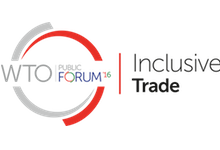Implementing the SDGs and achieving inclusive trade
28 Sep 2016 13:00h - 14:30h
Event report
[Read more session reports and live updates from the 2016 WTO Public Forum.]
This session, organised by the Commonwealth Secretariat, addressed the ways in which the sustainable development goals (SDGs) and trade objectives can be connected in mutually beneficial ways.
Marwa Kisiri, Ambassador and Head of the ACP Office in Geneva, introduced the topic and the panellists. He painted a picture of the changing landscape of trade patterns and the threat of fragmentation. This, he said, might be mitigated by e-commerce and digital trade, which could potentially integrate networks.
Patrick Low, Vice-President of Research and Senior Fellow at the Fung Global Institute, emphasised the importance of upgrading value chains and promoting the role of services in trade. Concerning the SDGs, he argued that we should think about who is taking charge of their implementation, as ‘they’re not going to come to anything, if governments don’t take responsibility.’
Niall Meagher, Executive Director of the Advisory Centre of WTO Law, highlighted the legal dimensions of the WTO, which often leave extensive policy space for governments, as they can use or misuse this space. The task for governments is to use this policy space wisely and create a regulatory environment that is conducive to the achievement of the goals, while not limiting trade.
Ratnakar Adhikari, Executive Director of the Enhanced Integrated Framework of the WTO, discussed the potential of trade and sustainable development to be mutually supportive, focusing on least developed countries (LDCs). He highlighted three components of his work to advance LDCs’ trade and development:
- Providing an institutional and policy framework.
- Providing targeted support to help LDCs alleviate poverty.
- Leveraging partnerships to enhance LDCs trade capabilities.
Mere Falemaka, Ambassador and Permanent Representative of the Pacific Island Forum Secretariat to the WTO, provided examples from the Pacific in implementing the SDGs and its challenges. She pleaded for cooperation and policy coherence across the Pacific region, and the measurement of the goals by using regionally developed indicators. She also mentioned e-commerce as an area that is being explored for inclusive trade. She concluded by stating: ‘If we are to strengthen the role of trade in contributing to the achievement of the SDGs, trade needs to be embedded in national and regional plans to improve the role and synergy between trade and SDGs.’
Falemaka’s focus on trade capacity development among LDCs was shared by a representative from the International Centre for Trade and Sustainable Development (ICTSD), who quoted the statement: ‘SDGs are going to be won or lost in LDCs.’ He gave many examples of the challenges faced by LDCs to achieve the SDGs, and emphasised the importance of the service sector in boosting trade and development.
by Barbara Rosen Jacobson
Related topics
Related event

